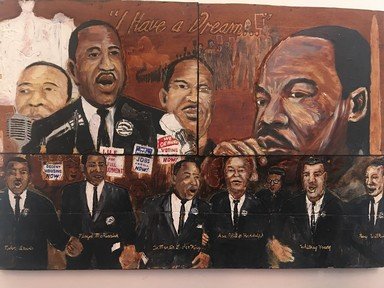Quiz Answer Key and Fun Facts
1. Emmett Till was born on July 25, 1941 in Chicago, Illinois. At the time of the murder, he was a healthy fourteen year-old with a stocky build, but as a child he had suffered from a serious and debilitating illness; what was it?
2. Emmett's mother, Mamie Till, was reluctant to allow Emmett to go to Mississippi to stay with some of her relatives, but Emmett's persistence eventually won out and she sent him to stay with her cousin, Moses (Preacher) Wright. Before sending him to Mississippi, Mamie advised Emmett to be himself and not to be intimidated by whites.
3. The incident that triggered Emmett's murder occurred in the town of Money, Mississippi, at Bryant's Grocery, run by Roy Bryant and his wife Carolyn. Emmett is alleged to have flirted quite brazenly with Carolyn, who was alone in the store at the time, although accounts differ as to exactly how brazen he was. Which of the following was Emmett NOT said to have done during his visit to the store?
4. When her husband Roy Bryant returned home five days after the incident at the store, Carolyn immediately told him that she had been insulted by a black youth.
5. Emmett was abducted from the home where he was staying early in the morning of August 28, 1955 by Roy Bryant and his half-brother, J.W. Miliam. Which family member answered the door, spoke to the two men, and later identified them in court?
6. On August 31, a young boy fishing in the Tallahatchie River noticed Emmett's body in the water, caught on a low-hanging tree branch. Emmett had been forced to strip naked and was horribly brutalized before being weighted and thrown into the river. What had been the cause of death?
7. Emmett's body was in a severe state of decomposition when it was found, apart from the damage to the face, making identification difficult, however a certain item found on the corpse helped to identify it as Emmett. What was it?
8. At Mamie Till's insistence, Emmett's body was sent by train back to Chicago for burial. Although Mamie fainted when she saw the horribly battered and water-logged remains of her son, she ultimately made the brave (and, no doubt, wrenching) decision to have an open casket at the funeral. By this time, the Till murder had become a cause-celebre throughout the country and, indeed, the world. Which of these magazines originally published unedited photos of Till's body laid out in the casket?
9. Emmett's father had been executed for murder in Italy while serving in the army during WWII.
10. Incredibly, despite a mountain of evidence, circumstantial and otherwise, the two killers were acquitted of both murder and kidnapping on September 23, 1955. What reason did the jury members offer as an excuse for this verdict?
11. Widespread outrage over the Till verdict became even more intense when the two killers gave an interview for "Look" magazine in which they boldly admitted to having murdered the boy. How long after the trial did this take place?
12. Which of the following key events in the history of the civil rights movement took place just over three months after Emmett Till's murder and was, in fact, prompted by it?
13. The Emmett Till case has inspired many writers, poets, and songwriters. Which of the following was NOT created to memorialize the Till case?
14. After their fifteen minutes of fame were over, Bryant and Miliam returned to their respective businesses in Money, Mississippi (Miliam took up farming, Bryant returned to his store), but each found himself dogged by failure. What was the principal reason for their respective failures?
15. In early 2003, the PBS (Public Broadcasting System) aired a documentary on the Till murder. Till's mother Mamie was interviewed for this program. Did she live to see it air on television?
Source: Author
jouen58
This quiz was reviewed by FunTrivia editor
Beatka before going online.
Any errors found in FunTrivia content are routinely corrected through our feedback system.

